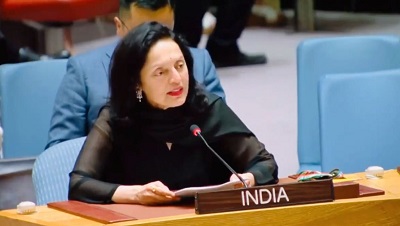United Nations, (Samajweekly) India has called for an “immediate de-escalation and eschewing of violence” in Gaza but stopped short of specifically mentioning a ceasefire, which is now a broad demand across the UN but opposed by Israel.
“In order to arrive at a lasting solution, we urge for an immediate de-escalation and eschewing of violence,” India’s Permanent Representative Ruchira Kamboj told the UN General Assembly on Monday.
She also called for “the release of all hostages, avoiding provocative and escalatory actions and to work towards creating conditions for an early resumption of direct peace negotiations”.
While reiterating New Delhi’s “strong” condemnation of civilian deaths in the conflict, Kamboj noted that the “immediate trigger” for the Gaza conflict was “the terror attacks in Israel on October 7, which were shocking and deserve our unequivocal condemnation”.
“India has a longstanding and uncompromising position against terrorism in all its forms and manifestations,” she said.
On the conflict that has resulted in massive civilian casualties, she said, “It is critical to prevent further escalation of violence and hostilities. It is imperative to avoid the loss of civilian lives in any conflict situation. International law and international humanitarian law must be respected under all circumstances.”
According to the Gaza health ministry, over 30,000 people have been killed, most of them children and women, since Israel waged retaliatory attacks on the territory after Hamas struck Israel killing over 1,200 people and taking more than 190 people, many of them children, hostage.
Kamboj warned about the dangers of the spillovers of the Gaza conflict.
“The humanitarian crisis has deepened, and the region and beyond have seen rising instability,” she said.
The conflict has found echoes in the Red Sea area where Houthis have attacked ships and were counterattacked by other countries and in Lebanon with confrontations between Israeli forces and Hezbollah.
Kamboj spoke during a debate on the US veto last month of a Security Council resolution calling for an immediate humanitarian ceasefire.
The debate was held under an Assembly resolution mandating a meeting after a veto is cast to have that permanent member explain the action and for UN members to react to it.
Kamboj made no mention of the US veto or the exercise of veto powers by the five permanent members of the Security Council, which has paralysed it on Ukraine or Gaza or the efforts to curtail the use of vetoes in special circumstances, and has been criticised by several speakers during the debate.
India, which aspires to a permanent seat on the Security Council, holds that as long as the veto exists it should be available to any new permanent members.
UN officials have warned of an impending threat of famine in a battered Gaza where relief supplies have been severely limited.
Kamboj said, “India has provided humanitarian aid to the people of Palestine and will continue to do so.”
“It is imperative that humanitarian aid to the people of Gaza be scaled up immediately in order to avert a further deterioration in the situation,” she said.
General Assembly President Dennis Francis said it was “deeply regrettable” that the body had to take up the Security Council veto issue in the context of Gaza.
He called for an immediate cease-fire and the freeing of hostages, which he said had been endorsed unambiguously by an overwhelming majority of the Assembly.
“Each day that passes risks a deepening failure to meet our moral duties and obligations; and each life lost adds to the stain on our collective conscience,” he said.
US Deputy Permanent Representative Robert Wood defended the veto asserting that the resolution proposed by Algeria and asserted that it “could disrupt the intensive efforts already underway to get an agreement that results in the release of the remaining hostages and that produces a temporary ceasefire”.
Washington was isolated at the 15-member Security Council where 13 members voted for it while Britain abstained.
Wood said that negotiations were ongoing with the participation of Eqypt and Qatar for the release of hostages and a humanitarian ceasefire.
The US was circulating a draft Security Council resolution to “support these sensitive negotiations”.
On Sunday, Vice President Kamala Harris joined the calls for an immediate ceasefire.
“Given the immense scale of suffering in Gaza, there must be an immediate ceasefire, for at least the next six weeks, which is what is currently on the table,” she said.
Earlier at the Assembly, Palestine’s Permanent Observer Riyad Mansour, holding up a picture of a child who died from the consequences of starvation, accused Israel of using starvation as a weapon.
“Israel has been committing atrocities against the Palestinian people, unchecked and unhinged,” he said, and “the era of Israeli impunity must come to an end, and we should enter a new era of accountability and sanctions”.
Israel’s Permanent Representative Gilad Erdan launched a tirade against the UN calling it a “collaborator” of Hamas.
He said that the UN has not condemned Hamas for the terrorist attack on Israel.
From the rostrum, he played on tablet statements by Israeli women about the rapes and sexual abuse that took place during the attack.
He asserted that a ceasefire would only give Hamas a “greenlight” to continue its abuse of women.
Later at a news conference, UN’s Special Representative on Sexual Violence in Conflict Parmila Patten said that during a visit to Israel and the West Bank, she and her team had been able to establish that rape, gang rape and other forms of sexual violence took place during the October 7 attack.
But she said that several Palestine groups as well as civilians were also present in Israel during the attack and it could not be established if Hamas itself was involved in the incidents of sexual attacks.
She said that on the West Bank, her team did not find instances of rape by the Israeli military or by Israeli settlers, but did record instances of women being threatened with rape and being subjected to invasive searches.








